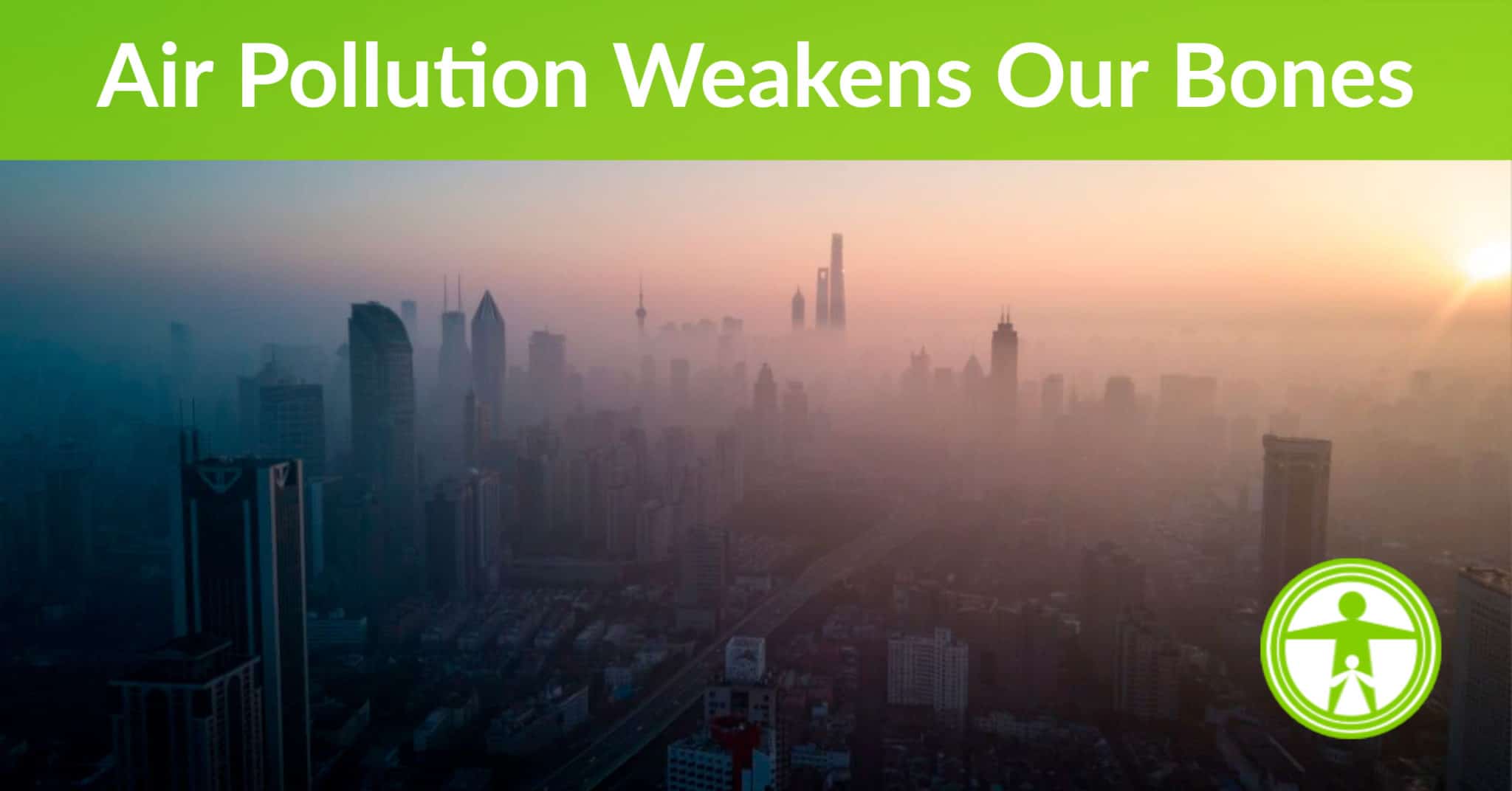Pollution, Toxins and Your Health
Each Year, An estimated 1.2 Billion pounds of toxic chemicals are released into the air & water in the United States alone, with approximately 80,000 different Chemicals.
Less than 10% of these chemicals have had any safety evaluations.
As a child, I still remember TV commercials from chemical companies with sales slogans that said, “Better Living Through Chemistry!”
As we advance in our ability to make products that are more efficient and effective, we have also increased our toxic burden in the world.
Chemicals play a significant role in many of the products that we take for granted in modern society such as adhesives, ceramics, electronics, plastics and petroleum.
Modern agriculture is an area where the use of specific chemicals has allowed for mass food production resistant to common pests.
However, the impact of these chemicals on the environment and human health can be severe and lasting.
Although scientists have yet to fully uncover the long-term effects of these chemicals in our environment, food or bodies, they have discovered more than 200 chemicals in the newborn umbilical cord blood of babies.
Another study foundwide exposure to environmental toxins in cohorts of pregnant women. Eight of the 59 chemicals analyzed were detected in more than 90 percent of both the maternal and cord blood samples, with the median number of chemicals at 25 in maternal blood and 17 in umbilical cord blood.
Birth defects, immunological disorders, developmental disabilities such as autism, ADD/ADHD and autoimmunity are all linked to chemical exposure.
A recent study is now suggesting that living in polluted cities may make our bones weaker and easier to break!
Air Pollutants Linked to Reduced Bone Mass
A study of nearly 4,000 people in India found those who inhaled more toxic airborne particles had less bone mass in their spines and hips.
Researchers believe that our bones become weak because of tiny pollutants that make their way into the blood when inhaled, causing the ageing process to speed up.
Say what? Air pollution might make you age faster?
Yes. Inhalation of toxic compounds or nanoparticles can seep into your blood stream and cause a loss of bone mass and accelerated ageing due to the production of oxidative stress (tissue damage) and inflammation.
But this isn't new news.
A 2018 study by Columbia University of more than nine million people was the first to find a link between traffic fumes and fractures caused by osteoporosis.
Previous studies have linked air pollution to low levels of parathyroid hormone, which regulates calcium production, leading to more fragile bones.
Osteoporosis is a health condition that weakens bones, making them fragile and more likely to break.
Broken bones aren't fun, but within a year of a bone fracture in older adults, the risk of death increases by 20 percent, with only 40% regaining full independence!
In two separate studies, Dr Baccarelli, a world leader in the science of epigenetics which examines the effect of environmental factors on our genetics, found that vitamin B can reduce pollution fueled cardiovascular disease, and damage to DNA.
While supplements and nutrition are important, focusing on helping your body to rid these pollutants needs to be a comprehensive and holistic effort.
Described as an invisible killer, pollution causes an estimated seven million premature deaths a year worldwide, according to the World Health Organisation.
But it's not just ageing or brittle bones, heavily polluted cities have been also been linked to an increased risk of stroke, heart disease, lung cancer, acute respiratory diseases such as asthma and even dementia.
What Else Does Pollution Do To Us?
CAUSE CHILDREN TO HAVE A LOW IQ: Researchers at the University of California, San Francisco, found in May 2019 that children born to mothers who live in polluted areas have an IQ that is up to seven points lower than those living in places with cleaner air.
CAUSE CHILDREN TO HAVE POORER MEMORY: Researchers at the Barcelona Institute for Global Health found boys exposed to greater levels of PM2.5 in the womb performed worse on memory tests by the time they are 10.
DELAY THE DEVELOPMENT OF CHILDREN: Youngsters who live less than one-third of a mile away from busy roads are twice as likely to score lower on tests of communication skills in infancy, found researchers at Eunice Kennedy Shriver National Institute of Child Health in April. They were also more likely to have poorer hand-eye coordination.
MAKE CHILDREN MORE ANXIOUS: University of Cincinnati scientists claimed pollution may alter the structure of children's brains to make them more anxious. Their study of 14 youngsters found rates of anxiety was higher among those exposed to greater levels of pollution.
CUT YOUR CHILD'S LIFE SHORT: Children born today will lose nearly two years of their lives because of air pollution, according to a report by the US-based Health Effects Institute and the University of British Columbia in April 2019. UNICEF called for action on the back of the study.
RAISE A CHILD'S RISK OF AUTISM: Researchers at Monash University in Australia discovered youngsters living in highly polluted parts of Shanghai have a 86 per cent greater chance of developing ASD. Lead author Dr Yuming Guo said: ‘The developing brains of young children are more vulnerable to toxic exposures in the environment.'
CAUSE ASTHMA IN CHILDREN: Four million children around the world develop asthma each year because of road traffic pollution, a major study by academics at George Washington University estimated. Experts are divided as to what causes asthma – but exposure to pollution in childhood increases the risk by damaging the lungs.
MAKE CHILDREN FAT: University of Southern California experts found last November that 10 year olds who lived in polluted areas when they were babies are, on average, 2.2lbs (1kg), heavier than those who grew up around cleaner air. Nitrogen dioxide pollution could disrupt how well children burn fat, the scientists said.
LEAVE WOMEN INFERTILE EARLIER: Scientists at the University of Modena, Italy, claimed in May 2019 that they believe pollution speeds up ageing in women, just like smoking, meaning they run out of eggs faster. This was based on them finding almost two-thirds of women who have a low ‘reserve' of eggs regularly inhaled toxic air.
RAISE THE RISK OF A MISCARRIAGE: University of Utah scientists found in January that pregnant women are 16 per cent more likely to suffer the heartbreak of a miscarriage if they live in areas of high pollution.
RAISE THE RISK OF BREAST CANCER: Scientists at the University of Stirling found six women working at the same bridge next to a busy road in the US got breast cancer within three years of each other. There was a one in 10,000 chance the cases were a coincidence, the study said. It suggested chemicals in the traffic fumes caused the cancer by shutting down the BRCA genes, which try to stop tumours growing.
DAMAGE A MAN'S SPERM: Brazilian scientists at the University of Sao Paulo found in March that mice exposed to toxic air had lower counts and worse quality sperm compared to those who had inhaled clean air since birth.
MAKE MEN LESS LIKELY TO GET SEXUALLY AROUSED: Scientists at Guangzhou Medical University in China found rats exposed to air pollution struggled to get sexually aroused. Scientists believe it may also affect men, as inhaling poisonous particles may trigger inflammation in blood vessels and starve the genitals of oxygen – affecting men's ability to become sexually aroused.
MAKE MEN MORE LIKELY TO HAVE ERECTILE DYSFUNCTION: Men who live on main roads are more likely to have difficulty getting an erection due to exposure to pollution, a Guangzhou University in China study suggested in February. Toxic fumes reduced blood flow to the genitals, tests on rats showed, putting them at risk of developing erectile dysfunction.
RAISE THE RISK OF PSYCHOSIS: In March, King's College London scientists linked toxic air to intense paranoia and hearing voices in young people for the first time. They said uncovering exactly how pollution may lead to psychosis should be an ‘urgent health priority'.
MAKE YOU DEPRESSED: Massachusetts Institute of Technology researchers found in January that that the more polluted the air, the sadder we are. Their study was based on analysing social media users in China alongside the average daily PM2.5 concentration and weather data where they lived.
CAUSE DEMENTIA: Air pollution could be responsible for 60,000 cases of dementia in the UK, researchers from King's College London and St George's, University of London, calculated last September. Tiny pollutants breathed deep into the lungs and enter the blood stream, where they may travel into the brain and cause inflammation – a problem which may trigger dementia.
Key Takeaways & Tips
In order to protect ourselves and our children against environmental toxins in the modern environment, we should:
- Reduce exposure as much as possible
- Support detoxification pathways
- Cultivate a healthy gut microbiota
Here's a few additional tips:
- Make sure you have optimal levels of iodine and selenium. Optimal iodine and selenium intake has been found to attenuate the toxic effects that heavy metals and perchlorate can have on the thyroid.
- Purchase a high-quality water filter for their drinking and bathing water; municipal tap water can be a significant source of toxins. However, a water pitcher filter is not enough if one hopes to remove as many toxins as possible. Reverse-osmosis filters, on the other hand, have been found to effectively remove perchlorate, pesticides, PCBs, plastics, and a wide variety of heavy metals.
- When possible, eat organic food or purchase your food from a local farm or market as much as possible. This will help to not only reduce pollution but minimize excessive pesticide and herbicide exposure.
- Stop using synthetic antibacterial products and to limit your use of plastics at home. If you still choose to use some plastic products, look for “BPA-free” options. However, keep in mind that BPA-free products may still contain other bisphenol derivatives with potential thyroid-disrupting effects, so it really may be best to entirely avoid drinking from or storing food in plastic containers.
- Stop using non-stick cookware. PFOA from non-stick cookware can leach into food and is subsequently ingested. Suggest that they use stainless steel or enameled cast iron cookware instead.



